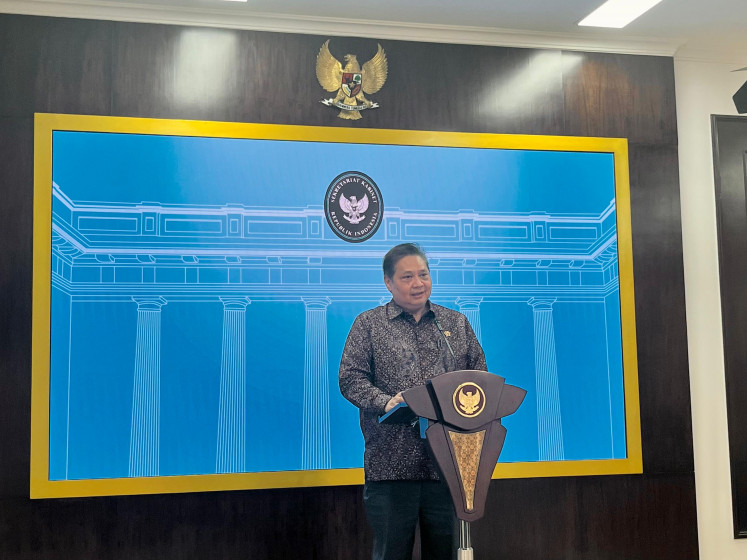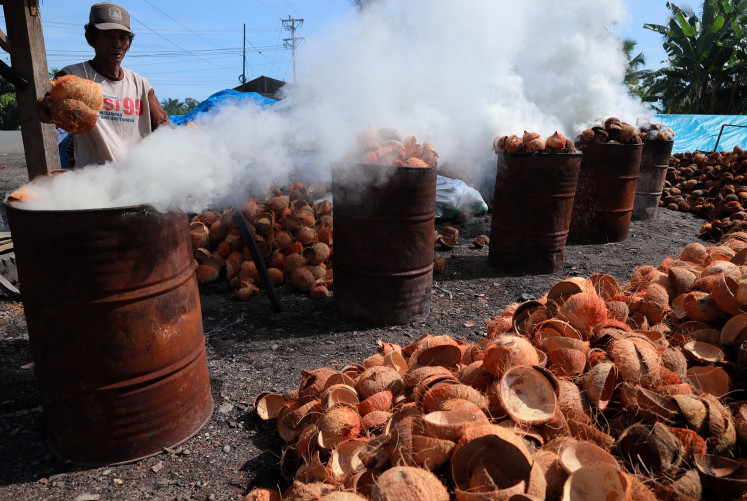After two years of losses, J Trust aims to be back in black this year
Private lender Bank J Trust Indonesia, formerly known as Bank Mutiara, aims to post its first profit in 2015 after two consecutive years of losses, its boss has said
Change text size
Gift Premium Articles
to Anyone

P
rivate lender Bank J Trust Indonesia, formerly known as Bank Mutiara, aims to post its first profit in 2015 after two consecutive years of losses, its boss has said.
'We have put some measures in place that we believe will help us book profit, at least starting the third quarter,' J Trust president director Ahmad Fajar said, upbeat about being in the black again this year.
Bank J Trust, which was taken over by Japanese holding company J Trust last year, suffered from net losses in 2013 and 2014.
Its financial reports show that the net loss amounted to Rp 1.14 trillion (US$86.21 million) in 2013 and Rp 662 billion in 2014 as a result of credit quality deterioration.
This year, the bank has set its net profit target at around Rp 57 billion.
It has received Rp 600 billion in additional capital so far from its new parent company. Fajar said that the fresh funds would help J Trust expand its lending capacity toward higher yield loan segments.
'We want to penetrate deeper into consumer and SME [small and medium enterprise] markets that offer higher yields than others. We are also looking to reach out to Japanese firms in Indonesia, supported by our parent company,' he said.
One business sector that J Trust is now targeting is heavy equipment. It sees gold there, thanks to the government's massive infrastructure plans. 'Many of these [heavy equipment] firms hail from Japan,' Fajar said.
J Trust hopes to see its lending portfolio rise by between 25 percent and 30 percent compared to last year, bringing its outstanding portfolio to Rp 9.8-10.2 trillion. The target is higher than the banking regulator's forecast of between 15 percent and 17 percent for overall nationwide commercial banks.
Higher loans will drive its loan-to-deposit ratio (LDR) higher as well, up to between 85 percent and 88 percent from 71.1 percent in 2014.
The growth of its third-party funds or customer deposits (DPK) will hopefully be in line with that of its loans, according to Fajar.
'We are working to shift some of our deposits to CASA [current account and savings account] from time deposit,' he said, adding that the move was expected to reduce J Trust's costs of funds.
In the first quarter, its DPK stood at Rp 10.2 trillion, of which 10.3 percent was made up by CASA.
The CASA is estimated to reach 17 to 20 percent of its total DPK by year-end as the lender is now also focused on managing payrolls, assisted by its revamped information technology system.
Fajar said that it would soon launch its own internet banking platform, which would be followed by a mobile banking system.
Meanwhile, according to Fajar, its strategies to focus on high-yield loans and to boost the portion of its CASA will help the lender jack up its net interest margin (NIM) to hover at around 2.5 percent from the 0.2 percent reported in 2014.
It expects to see an improvement as well in its non-performing loan (NPL) ratio, with the net ratio set at 3 percent by the end of the year, bringing it closer to the average domestic banking industry's bad loans of above 2 percent, and down from the 5.4 percent the bank booked last year.
In November last year, J Trust officially took over 99 percent ownership of Bank Mutiara, which in 2008 as Bank Century was bailed out by the government in a controversial policy.









